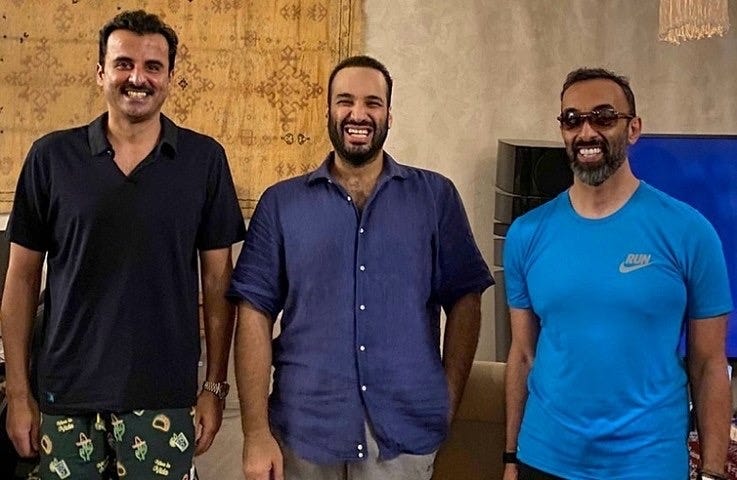It’s been fascinating to watch the twists and turns of Middle East regional alignments lately. Turkey’s President Recep Tayib Erdogan visited Saudi Arabia a few days ago in search of some desperately needed cash, offering up Jamal Khashoggi’s murder case as a down payment on a relationship reset. His embrace of previous arch-enemy Mohammad Bin Salman followed Turkey’s recent reconciliation with the United Arab Emirates, its other great rival in the previous decade’s proxy wars and regional competition.
Erdogan’s visit raised eyebrows, but would have had to clear a higher bar to match the optics of last year’s relaxed visit by Qatar’s Emir Tamim with MBS at a Red Sea resort. There was admittedly something surreal about suffering through four years of hysterical Saudi-UAE propaganda demonizing Qatar as the source of all evil in the world ending up with some happy bros smiling in bathing suits at a resort. Kristian Coates Ulrichsen has the best book on that whole bizarre Qatar boycott episode; it was wild. If nothing else, it was amusing to watch a whole set of media and commentators switch up their flow on a dime.
Erdogan’s visit to Saudi Arabia means that we’ve now seen a rapprochement between four of the five major powers whose regional competition defined the post-2011 period. And there’s still a longshot bet to be made on five for five, as Saudi Arabia and Iran have quietly been holding talks for the last year. There wasn’t much reconciliation involved in the UAE’s overrated “Abraham Accords” with Israel, with which it already enjoyed good relations before making it official, but it can be tossed on the reshuffling pile. Distastefully, but within this broad rubric, the UAE ostentatiously hosted Syria’s abominable President Bashar al-Assad to talk normalization and reconstruction.
And we’re seeing downstream effects as well. Most notably, Yemen’s warring parties announced a two month ceasefire which has, surprisingly, lasted so far. Libya’s been in a sullen, shaky standoff for the last couple of years, since Turkey helped ensure the failure of the UAE-backed Khalifa Haftar’s march on Tripoli.
At one level, these reconciliations just vindicate Realist cynicism about states having no permanent friends or enemies, just permanent interests. But those destructive interventions were never just about the bad policy choices of any one state. They were systemic. Half a decade ago, in “The New Arab Wars” I wrote about the devastating effects of unchecked proxy warfare and competitive interventions as a structural response to the existential insecurity regimes felt following the Arab uprisings of 2011. Failing and transitional states offered opportunities for the wealthier and more stable states to intervene, but also a deep fear that their rivals would take advantage if they didn’t. That particular regional security dilemma fueld competitive intervention dynamics that kept regional powers trapped in destructive civil wars which they knew they couldn’t win but couldn’t figure out how to leave.
The current rash of realignments tells us that structure is changing.
It’s manifestly a good thing that the regional mood now leans towards de-escalation and rapprochement. It’s hard to emphasize enough that the regional proxy wars and competitive interventionism of the last decade were bad. Nobody won them. They had overwhelmingly negative consequences for almost every aspect of regional politics. They prolonged and exacerbated devastating civil wars. They undermined and ultimately trashed democratic transitions which might have succeeded in a more supportive international environment. They entrenched deep polarization along sectarian lines and around questions of political Islam. They trapped their protaganists in unwinnable wars with unfathomable human costs. They produced untold misery, created a generation of refugees, destroyed so much for so little gain. At least for now, regional powers are restraining rather than accelerating those conflicts. Good riddance to bad policies.
Why now? Maybe the perceived US retrenchment from the region led regional powers to recalibrate, which would definitely be a positive signal of the value of such US retrenchment. Maybe they responded to the shift from Trump to Biden and decided to lower the temperature, despite Washington’s chippy relations with Riyadh and Abu Dhabi. Maybe the fear of another wave of Arab uprisings has receded, and less insecure authoritarian regimes no longer feel the need to meddle abroad. Maybe the regional powers just tired of paying the mounting costs of the intractable, destructive conflicts they had spent a decade fueling - particularly with escalating Houthi counterattacks against Gulf targets imposing previously unthinkable costs - and decided to cash it in. Maybe all of the above.
If the “New Arab Wars” structure is gone, what comes next? Perhaps it’s morphing into something recognizably similar to the pre-2011 regional order (Gulf states cooperating with Israel against Iran while suppressing Islamist and democratic challengers). Most Arab regimes would probably like that. But it’s more likely evolving into something new, considering the decline of American global primacy and its alliances, the unpredictable effects of the Ukraine war, the continuing checkerboard pattern of failed and failing states across the region, the ramifications of the potential final collapse of the effort to rebuild the nuclear agreement with Iran, the closing of prospects for Israeli-Palestinian peace, and the likelihood of renewed eruptions of mass protest movements as economic, environmental and governance conditions continue to deterioriate.
There’s no guarantee that regional rapprochement will produce real political solutions or stable peace in any of the shattered battleground states. Yemen’s ceasefire is a very slender reed, which could easily just be a pause to reshuffle the decks for another round of war. Libya’s calm could explode at any moment, as almost happened with the misguided push for elections a few months ago. Syria’s simmering along through economic catastrophe and the legacies of regime atrocities could boil over. Ongoing attacks by Islamic State remnants and Shi’a militias, along with its endemic political stalemate, could cause Iraq to erupt again. Nor does the lower regional temperature doesn’t promise stability to the autocratic regimes now populating the rest of the region (with Tunisia’s rapid descent into personalistic autocracy closing the last open page on democratic transitions), especially with the escalating pressures on food and energy prices driven by Russia’s invasion of Ukraine. And, of course, the failure of nuclear talks with Iran could lead to military escalations with potentially devastating consequences for all of this.
Most op-eds would now pivot to a call for a more active US policy here, with a list of things Washington must do before it’s too late. I’d certainly like to see the US be more aggressive about pushing on human rights and democracy and on the Palestinian issue, for all the good it would do. Finally succeeding in closing the Iranian nuclear talks would help to lock in positive regional developments, and hopefully prevent dangerous military escalations. But beyond that, all of these regional trends suggest that perceived US disengagement has been good for the region. Let the regional powers talk trash about Washington. For the first time in a decade, they are actually doing constructive things rather than pouring fuel on the fire.
It’s not like Washington has to fend off any real global challengers in the Middle East. The world has become multipolar, and regional powers will obviously look for alternative patrons where they can. But Russia’s disastrous war in Ukraine has left it a degraded, empty shell with little to offer would-be clients. And China has shown little interest in converting it’s ever growing energy and trade interests into a political role in the region. For all the global tension between China and the US, they broadly share the same interests in the Middle East: keeping the oil flowing and preventing major war.
So the logic which drove the New Arab Wars is finally sputtering out. What comes next? For now, I’ll just say that the new regional order is coming into shape probably won’t be the one we expect. I expect to be writing a lot about these dynamics here over the coming months and years. Stay tuned.





